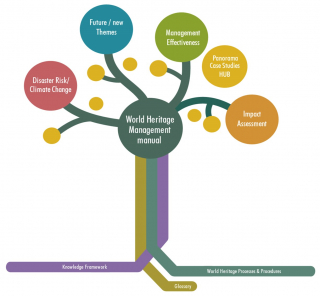Facing challenges of the COVID-19 pandemic, in 2020 the World Heritage Leadership Programme has concentrated heavily on knowledge production and active digital communication. In all aspects of the programme, we are working very closely with our partners and we convey our deepest thanks to the dedicated professionals and donors working with us. The programme is delivered by IUCN and ICCROM, in collaboration with ICOMOS and the UNESCO World Heritage Centre. We thank the Norwegian Ministry of Climate and Environment, the Swiss Federal Office for the Environment, and the Korean Cultural Heritage Administration for their continued support and engagement in all of our work.
Effective Management linking People, Nature, Culture
Work is currently ongoing in terms of producing a draft of the integrated Management Manual for World Heritage based on the development of the Knowledge Framework for managing World Heritage. The first working draft of the manual equipped with a full glossary will be produced by the end of 2020 and we are getting ready for many rounds of revisions and improvements to happen in the first half of 2021.
The Enhancing our Heritage toolkit, which is a management effectiveness assessment toolkit, is currently undergoing major revisions to make it applicable for cultural World Heritage sites as well. Originally designed as an assessment toolkit for natural properties, we are now aligning the content fully with the above-mentioned management manual so that the manual and toolkit can be used in conjunction. The toolkit is also going through various testing activities, where we are working with a small number of sites worldwide, to apply the toolkit and verify if the changes are useful and applicable. The toolkit revision will be completed within the first half of 2021.
World Heritage and Resilience
The Disaster Risk management manual is also currently being drafted, with the content being aligned to the Knowledge Framework for managing World Heritage so that risk management can happen on a daily management basis, but also to align with the upcoming Climate Change Policy Document being drafted by UNESCO. We are aiming for the manual to go through a full review and feedback process in the first half of 2021.
Impact Assessment for World Heritage
A single guidance document on Impact Assessment for World Heritage is being prepared on the basis of the existing 2011 ICOMOS Guidance on Impact Assessment for Cultural World Heritage Properties and the 2013 IUCN World Heritage Advice Note on Environmental Assessment. For this particular work we are working very closely together with the International Association for Impact Assessment (IAIA) to ensure that the guidance can also be used within the wider impact assessment sector. The first and second drafts of the document have been through an iterative review and feedback process in 2020, and we are aiming for the document to be finalized within the first quarter of 2021. The finalized document will be presented at the upcoming World Heritage Committee meeting scheduled for June/July 2021.
Linking sites and learning from practice – launch of the PANORAMA Nature-Culture Thematic Community
The new Nature-Culture Thematic Community was launched on the PANORAMA platform in October 2020. This is a platform where various case studies from all over the world can be uploaded directly by site managers. The new thematic community will be a space for heritage practitioners to share and reflect their experiences, and to learn with their peers how similar challenges have been addressed around the globe. The Nature-Culture Thematic Community highlights the importance of integrated heritage protection and management for sustainable development, looking at inspiring approaches which include the use of local and indigenous knowledge, and the engagement of local communities.
https://www.iccrom.org/themes/world-heritage/world-heritage-leadership/…
https://panorama.solutions/en/portal/nature-culture
Connecting with the world through the ICCROM Lecture Series
During the COVID-19 pandemic, the programme has strived to connect with practitioners by organizing diverse webinars through the ICCROM Lecture Series. A total of 6 webinars were delivered throughout the course of the year. All of these can be accessed through the ICCROM website (https://www.iccrom.org/iccrom-past-lecture-series) or the ICCROM youtube channel (https://www.youtube.com/channel/UClzDWnTz7nXMLlz9VeHXvgA). In particular the webinars on Impact Assessment are equipped with French translations.
- World Heritage Leadership - who are we connecting and how can you be a part?
- Heritage and Resilience: Building a symbiotic relationship
- Dialogue on ''Applying resilience thinking to heritage places: from theory to practice''
- Impact Assessment for World Heritage I - what are the main things you need to know
- Impact Assessment for World Heritage II - steps and processes
- PANORAMA, Nature-Culture thematic community - sharing practices and learning from heritage places
Programme evaluation – assessing what we’ve done and planning ahead
In 2020, the World Heritage Leadership Programme went through an external mid-term evaluation that focused on the current progress towards its intended goals and objectives and the likelihood of achieving the overall targets by completion. The evaluation was also designed to suggest improvements and draw lessons learnt to date to inform thinking about leadership support. The programme was evaluated on aspects of Relevance, Effectiveness, Impact, Efficiency and Sustainability and the evaluation was conducted by E.C.O Institute for Ecology. Overall, the Programme was concluded to be on track and successful in terms of fulfilling its objectives signalling positive outcomes. The full results from the Evaluation and the Management response from the Programme can be found in this link. https://www.iccrom.org/section/world-heritage-leadership
We are continuously participating in various statutory meetings for the World Heritage Convention, and responding flexibly to any technical advisory requests, conference and networking, and capacity building requests coming from Member States and partner organizations. In 2021, we are planning more online courses and activities, where we will be able to share more widely the content progress made in 2020.





